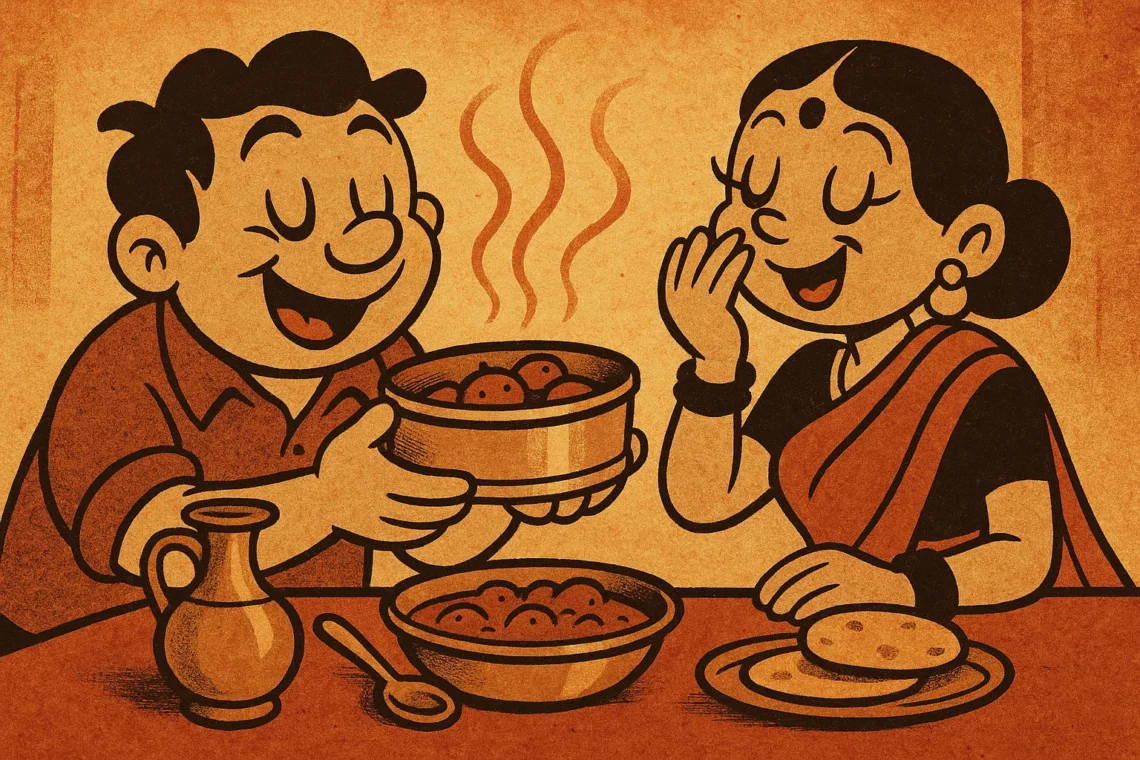In every Indian home, there exists a silent, sacred tradition: the returning of boxes. Sweet boxes, tiffin boxes, steel dabbas with locking lids, sometimes even reused biscuit tins from another era. These boxes arrive filled—often unexpectedly—with food that someone’s mother, aunt, or neighbor decided to send. And when they return, they come back empty… but not really. They come back carrying something else entirely: the smell of what was once inside.
The act is simple. You open the front door and someone hands you a box. “Maa ne bheja hai,” they say, like it’s an envelope, not a container of steaming rajma. You thank them. You don’t peek until you’re inside. Because these boxes carry more than meals—they carry intention. You open the lid and, instantly, the kitchen changes. The smell of their home enters yours: their spice mix, their ghee, their tadka timing. It lingers, curling around your stove and settling into the air like it’s trying to say, “We cooked this with you in mind.”
The Scent of Generosity
After the food is gone—after you’ve wiped the last drop of chutney with a reluctant piece of roti, after you’ve silently agreed this was better than your own version—you wash the box. Carefully. With hot water. No soap that’s too strong. You dry it with the good cloth. And still… the smell remains. It clings to the steel. A faint trace of hing or the warm comfort of cinnamon. It becomes a scent you now associate with someone else’s affection. Their style of home. Their way of saying, “You matter.”
And then comes the most important part: the return. Because in our culture, boxes don’t stay. They go back. Always filled with something—never empty. Maybe it’s a few pieces of mithai. Maybe some homemade pickles. Maybe just dry snacks from the last batch you made. Even if it’s just a fruit and a note, you never return a box as it came. That would break the circle.
Borrowed Vessels, Shared Stories
Every box has a story. The small steel dabba with the dented corner once carried lemon rice from a neighbor whose daughter had just gotten married. The square plastic container—now slightly orange from masala stains—brought over gajar ka halwa during a winter when your own gas cylinder ran out. The glass bowl with the chipped edge? It came from your aunt when she made too much rajma (on purpose, everyone knows it).
Each box is a conversation that happens without words. You don’t need to call. You don’t need to text. You send food. You receive food. The boxes travel back and forth like seasoned diplomats, carrying messages that don’t need translation: warmth, care, and the quiet joy of being thought of.
When the Smell Becomes Yours
Sometimes, when you return the box, the smell stays in your home a little longer. It clings to the kitchen towels. Hangs in the air above the sink. If you’re lucky, it finds its way into your own cooking the next day—subtle, but present. You stir your dal and think, “Why does this taste like their house?” And you smile. Because even though the box is gone, a little bit of what it brought remains. You didn’t just borrow their food. You borrowed their flavor memory.
In a World That Moves Too Fast
In a time of instant messages and food delivery apps, the box still endures. Slow, manual, slightly inconvenient. But full of meaning. Because there’s something deeply personal about a container that has traveled from one kitchen to another. It has sat on someone’s countertop. It has soaked up the steam of their cooking. It has carried their best intentions, across gates and corridors, into your hands.
And when you finally hand it back—clean, filled, slightly shinier than when it arrived—you do so knowing that this isn’t the end. It’s a cycle. An ongoing exchange of smells, tastes, and gestures. An unspoken ritual of returning… while keeping a little bit behind.
Because food disappears, boxes go back, but the smell? That stays with you. Quietly. Comfortingly. Like a secret gift that nobody asked for—but everybody understands.
Born in Mumbai, now stir-frying feelings in Texas. Writes about food, memory, and the messy magic in between — mostly to stay hungry, sometimes just to stay sane.












